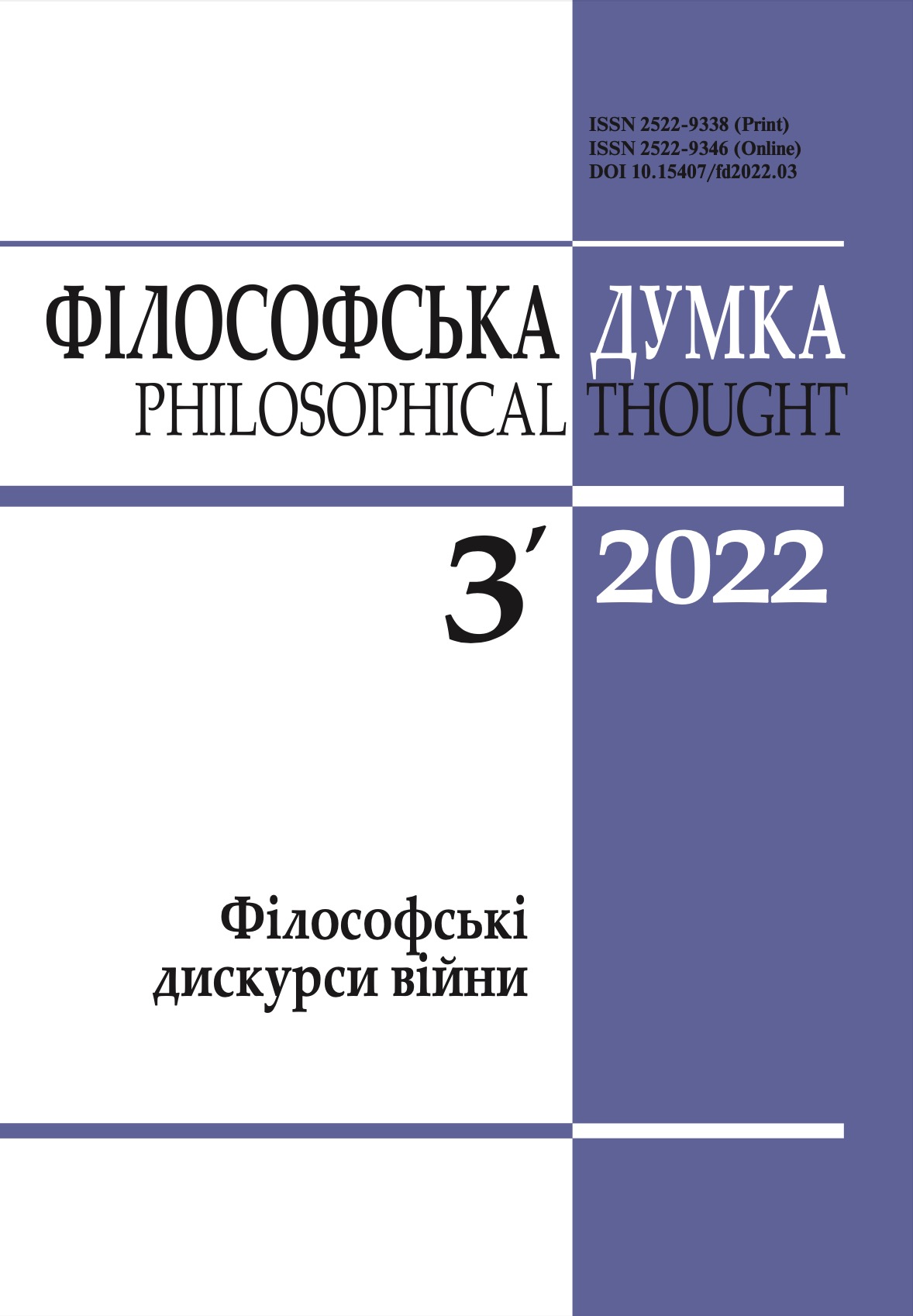HATRED AS A MORAL FEELING IN WAR TIME
DOI:
https://doi.org/10.15407/fd2022.03.098Keywords:
empathy, evil, moral value, retributive hatred, moral responsibility, war, resistanceAbstract
The article is devoted to the analysis of the phenomenon of hatred in philosophic, psychological, and ethical aspects, and of its motivating role during the war. Explicating the philosophical un- derstanding of hatred, the author analyzes the “Treatise of Human Nature” by Hume and ex- plains the structure of hatred as the unity of the elements “cause-object-end” as well as the role of empathy in their genesis. In the article, the author proves that hatred as a passion is not a hu- man instinct or only an emotion, while having an intention towards the understanding of another person and ethical evaluation of his or her motives and actions. The author analyzes the psycho- logical structure of hatred as a durable complex of negative attitudes, motives, emotions, and dispositions of a person formed in individual and social existence. The multilevel way of experience and content of hatred explicated by the range from simple negation of other beings to the ex- pression of moral judgement and demand of the retribution of hurt and struggle against evil.
The author analyzes the concept of hatred by R. and K. Sternberg as a negation of intimacy of the other combined with various emotions and commitments of a person to act. Based on that, the article discusses the possibilities of the acquisition of ethical content by hatred and analyzes the typology of hatred by J. Gee (simple hatred, prejudicial hatred, malice and spite, retributive hatred, and moral hatred). The author of the article argues that the higher forms of conscious and controlled hatred possess rational components and moral content. The author concludes that the retributive hatred as a reactive moral attitude towards the blame of the wrongdoer and the de- mand of holding him responsible is an appropriate form of motivation for the resistance during the war and the establishment of peace. This kind of hatred plays a legitimate role in a mature person’s moral life and can be ethically justified.
References
Descartes, R. (1989). Passions of the Soul [In Russian]. In: R. Descartes. Works in 2 vol. / Tr. from Lat. and Fr. Vol. I / Ed., intr.: V.V. Sokolov (pp. 481-572). Moscow: Mysl.
The Dhammapada [In Russian]. Retrieved from: https://psylib.org.ua/books/dhammap/index. htm.
Dobko, T. (2014). Apology of value in Max Scheler's "Formalism in Ethics and Non-formal Ethics of Values". Philosophical Thought, 4, 67-79.
Falceto, C. (2019). Love and Hatred in Hum(e)an Nature. Women in Philosophy Annual Journal of Papers, 10. Retrieved from: https://www.academia.edu/39187924/Love_and_Hatred_ in_Hum_e_an_Nature
https://doi.org/10.5840/wipj2019103
Gee, J.S. (2014). Retributive Hatred as a Reactive Moral Attitude. University of Washington. Ret- rieved from: https://digital.lib.washington.edu/researchworks/bitstream/handle/1773/27557/ Gee_washington_0250E_13793.pdf?sequence=1
Hume, D. (1739-1740). A Treatise of Human Nature: being an Attempt to Introduce the experi- mental Method of Reasoning into Moral Subjects. Retrieved from: https://davidhume.org/ texts/t/
Kuchmanich, I.N., Selivanova, S.V. (2013).The Phenomenon of Hatred as the Object of Psychological Analysis. [In Ukrainian]. Collection of Research Papers of V. О. Sukhomlynskyi National University of Mykolaiv. Psychological Sciences, 2 (10 : 91), 182-185.
Proleiev, S. (2019). Apologia of Vices. [In Russian]. Кyiv: Duch i Litera.
Scheler, M. (1973). Formalism in Ethics and Non-formal Ethics of Values / Trans. by M. Frings and R. Funk. Evanston: Northwestern University Press, Sternberg, R.J., Sternberg, K. (2008). The Nature of Hate. Cambridge: Cambridge University Press.
Weber, М. (1998). Calling to Politics. [In Ukrainian]. In: M. Weber. Sociology. Universal Historical Analyses. Politics / Tr. from Germ. and comment. О. Pohorilyi (pp. 173-191). Кyiv: Оsnovy.
Yermolenko, A. (2022). Widerstand statt Verhandlung. [in German]. In: Franffurter Allgemeine. https://www.faz.net/aktuell/feuilleton/debatten/der-ukrainische-philosoph-yermolenko-antwortet-habermas-18044530.html.
Downloads
-
PDF (Українська)
Downloads: 525
Published
How to Cite
Issue
Section
License
Authors who publish with this journal agree to the following terms:
- Authors retain copyright and grant the journal right of first publication.
- Authors are able to enter into separate, additional contractual arrangements for the non-exclusive distribution of the journal's published version of the work (e.g., post it to an institutional repository or publish it in a book), with an acknowledgement of its initial publication in this journal.
- Authors are permitted and encouraged to post their work online (e.g., in institutional repositories or on their website) prior to and during the submission process, as it can lead to productive exchanges, as well as earlier and greater citation of published work (See The Effect of Open Access).


